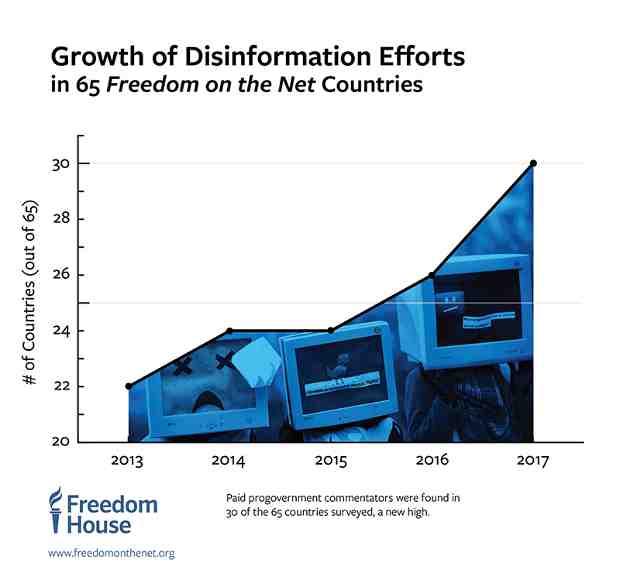How Governments Manipulate Social Media to Undermine Democracy

How Governments Manipulate Social Media to Undermine Democracy
Governments around the world have dramatically increased their efforts to manipulate information on social media over the past year.
The Chinese and Russian regimes pioneered the use of surreptitious methods to distort online discussions and suppress dissent more than a decade ago, but the practice has since gone global. Such state-led interventions present a major threat to the notion of the internet as a liberating technology. These are among the findings of the latest “Freedom of the Net 2017” report released by Freedom House, a Washington-based independent watchdog organization.
The report reveals that online content manipulation contributed to a seventh consecutive year of overall decline in internet freedom, along with a rise in disruptions to mobile internet service and increases in physical and technical attacks on human rights defenders and independent media.
Nearly half of the 65 countries assessed in Freedom on the Net 2017 experienced declines during the coverage period, while just 13 made gains, most of them minor.
Less than one-quarter of users reside in countries where the internet is designated Free, meaning there are no major obstacles to access, onerous restrictions on content, or serious violations of user rights in the form of unchecked surveillance or unjust repercussions for legitimate speech.
The use of “fake news,” automated “bot” accounts, and other manipulation methods gained particular attention in the United States. While the country’s online environment remained generally free, it was troubled by a proliferation of fabricated news articles, divisive partisan vitriol, and aggressive harassment of many journalists, both during and after the presidential election campaign.
According to the report, Russia’s online efforts to influence the American election have been well documented, but the United States was hardly alone in this respect.
Manipulation and disinformation tactics played an important role in elections in at least 17 other countries over the past year, damaging citizens’ ability to choose their leaders based on factual news and authentic debate.
Although some governments sought to support their interests and expand their influence abroad—as with Russia’s disinformation campaigns in the United States and Europe—in most cases they used these methods inside their own borders to maintain their hold on power.
The report reveals that Venezuela, the Philippines, and Turkey were among 30 countries where governments were found to employ armies of “opinion shapers” to spread government views, drive particular agendas, and counter government critics on social media.
The number of governments attempting to control online discussions in this manner has risen each year since Freedom House began systematically tracking the phenomenon in 2009.
But over the last few years, according to the report, the practice has become significantly more widespread and technically sophisticated, with bots, propaganda producers, and fake news outlets exploiting social media and search algorithms to ensure high visibility and seamless integration with trusted content.
Unlike more direct methods of censorship, such as website blocking or arrests for internet activity, online content manipulation is difficult to detect. It is also more difficult to combat, given its dispersed nature and the sheer number of people and bots employed for this purpose.
According to the report, the effects of these rapidly spreading techniques on democracy and civic activism are potentially devastating. The fabrication of grassroots support for government policies on social media creates a closed loop in which the regime essentially endorses itself, leaving independent groups and ordinary citizens on the outside.
And by bolstering the false perception that most citizens stand with them, authorities are able to justify crackdowns on the political opposition and advance antidemocratic changes to laws and institutions without a proper debate.
Worryingly, the report says, state-sponsored manipulation on social media is often coupled with broader restrictions on the news media that prevent access to objective reporting and render societies more susceptible to disinformation.
Successfully countering content manipulation and restoring trust in social media—without undermining internet and media freedom—will take time, resources, and creativity.
The first steps in this effort should include public education aimed at teaching citizens how to detect fake or misleading news and commentary. In addition, according to the report, democratic societies must strengthen regulations to ensure that political advertising is at least as transparent online as it is offline.
And tech companies should do their part by reexamining the algorithms behind news curation and more proactively disabling bots and fake accounts that are used for antidemocratic ends.
In the absence of a comprehensive campaign to deal with this threat, manipulation and disinformation techniques could enable modern authoritarian regimes to expand their power and influence while permanently eroding user confidence in online media and the internet as a whole, the report suggested.
Photo courtesy: Freedom House













